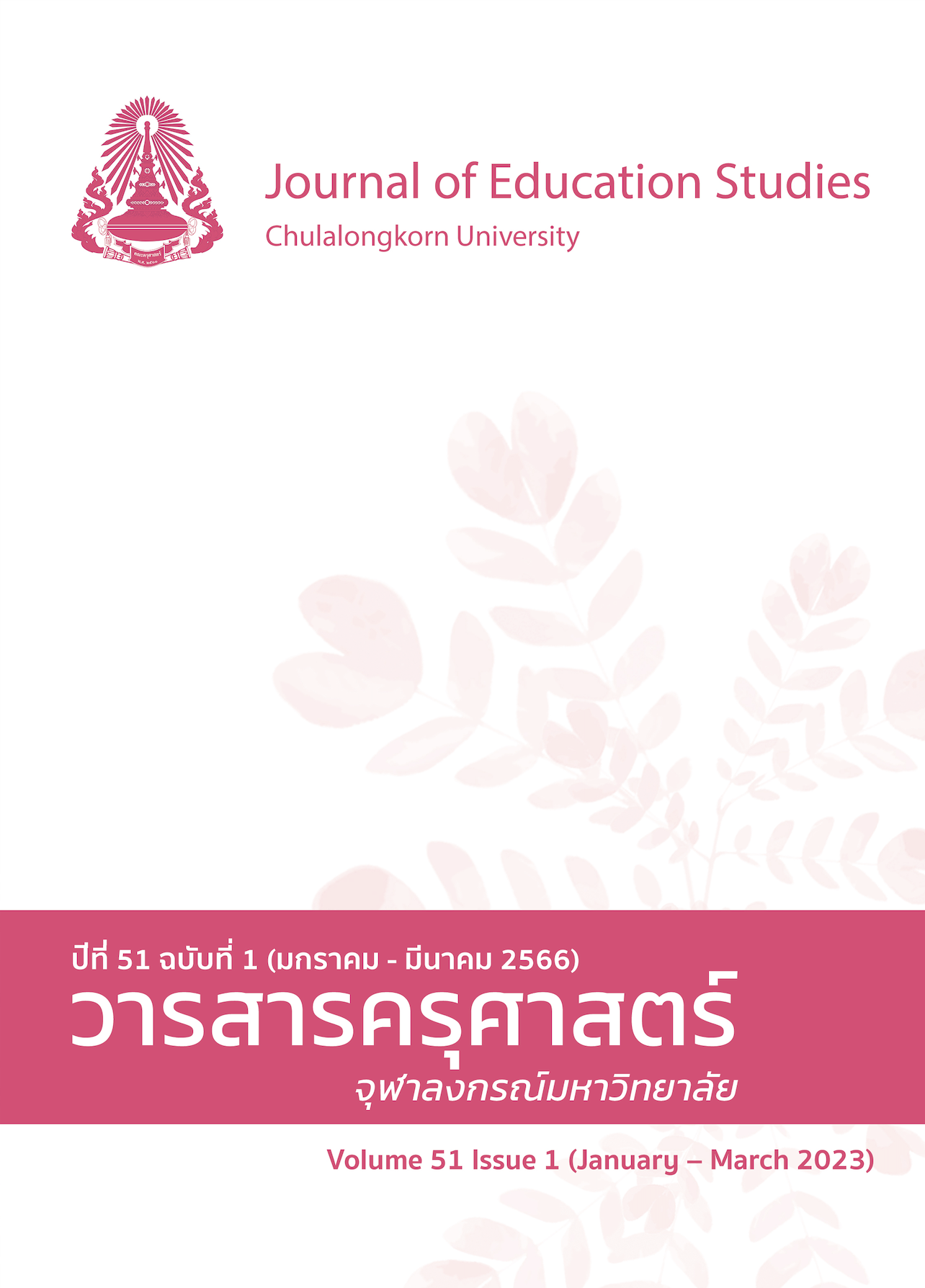Strategies for the Academic Administration According to the Digital Citizenship Concept of Educational Institutions under the Nakhon Ratchasima Primary Educational Service Area Office
DOI:
https://doi.org/10.14456/educu.2023.5Keywords:
academic management strategy, digital citizenshipAbstract
This research aimed to 1) study the conceptual framework of Academic Administration and Digital Citizenship, 2) study the needs of Academic Administration based on the concept of Digital Citizenship in schools in the Nakhon Ratchasima Primary Educational Service Area Office, and 3) develop strategies for Academic Administration based on the concept of Digital Citizenship. The sample groups for this research consisted of 306 schools, and the study employed multi-stage random sampling. The contributors were school directors and teachers. The research instruments consisted of conceptual framework evaluation, a questionnaire, and strategy evaluation. The data was analyzed using frequencies, percentages, means, standard deviations, PNI modified, and content analysis. The results of the study were as follows: 1. The Conceptual Framework consisted of the following: 1.1) Academic Administration, including (a) Curriculum Development for the schools, (b) Teaching and Learning Management, and (c) Measurements & Evaluation, as well as 1.2) Digital Citizenship, which consisted of three aspects: (a) developing self-respect and respecting others, (b) learning and self-development, and (c) being responsible and being secure. 2.The Development Priority Needs were: 2.1) Academic Administration, including the development of school curriculum, and 2.2) Digital Citizenship, such as taking responsibility and being secure. 3. Finally, The Strategies for Development were comprised of two aspects: 3.1) the strategies for developing the school Administrators, which were composed of three main strategies, with 14 sub-strategies, and 79 approaches, and 3.2) The Evaluation of Possibility and Feasibility, which was at a ‘High’ level.
References
รายการอ้างอิง
ภาษาไทย
กระทรวงเทคโนโลยีสารสนเทศและการสื่อสาร. (2559). แผนพัฒนาดิจิทัลเพื่อเศรษฐกิจและสังคม. กระทรวงเทคโนโลยีสารสนเทศและการสื่อสาร.
กระทรวงศึกษาธิการ. (2550). หลักสูตรพัฒนาผู้นำการเปลี่ยนแปลง เพื่อรองรับการกระจายอำนาจ สำหรับผู้บริหารการศึกษาและผู้บริหารสถานศึกษา. สถาบันพัฒนาครู คณาจารย์และบุคลากรทางการศึกษา.
กระทรวงศึกษาธิการ. (2551). หลักสูตรแกนกลางการศึกษาขั้นพื้นฐาน พ.ศ. 2551. ชุมนุมสหกรณ์การเกษตรแห่งประเทศไทย.
กระทรวงศึกษาธิการ. (2553). พระราชบัญญัติการศึกษาแห่งชาติ (ฉบับที่ 3) พ.ศ. 2553. สำนักงานกระทรวงศึกษาธิการ.
กระทรวงศึกษาธิการ. (2557). แผนแม่บทเทคโนโลยีสารสนเทศและการสื่อสารเพื่อการศึกษา ฉบับที่ 2 พ.ศ. 2557 - 2559. สำนักงานกระทรวงศึกษาธิการ.
กระทรวงศึกษาธิการ. (2564). ประกาศนโยบายและจุดเน้นของกระทรวงศึกษาธิการ ประจำปีงบประมาณ 2564-2565. https://www.moe.go.th
กิติพงษ์ ลือนาม. (2561). วิธีวิทยาการวิจัยทางการศึกษา. โคราชมาเก็ตติ้ง แอนด์ โปรดักชั่น.
จามจุรี จำเมือง. (2552). คู่มือเตรียมสอบผู้บริหารสถานศึกษาและผู้บริหารสถานศึกษา. เจริญดีมั่นคง.
ชัยวัฒน์ สุทธิรัตน์. (2561). การพัฒนาหลักสูตร ทฤษฎีสู่การปฏิบัติ. วีพรินท์.
โทเทิ้ล แอ๊คเซ็ส คอมมูนิเคชั่น จำกัด (มหาชน) (2558). โครงการ Sefe Internet. https://www.dtac.co.th/
sustainability/th/project/Project-SafeInternet
นิตยา วงศ์ใหญ่. (2560). แนวทางการพัฒนาทักษะการรู้ดิจิทัลของดิจิทัลเนทีฟ. วารสารมนุษยศาสตร์ สังคมศาสตร์ และศิลปะ, 10(2), 1630-1642. https://he02.tci-thaijo.org/index.php/Veridian-E-Journal/issue/view/8373
ประกาศกฎกระทรวงศึกษาธิการ เรื่อง กำหนดหลักเกณฑ์และวิธีการกระจายอำนาจการบริหารและการจัดการศึกษา พ.ศ. 2550. (2550,16 พฤษภาคม). ราชกิจกานุเบกษา. เล่ม 124 ตอนที่ 24 ก. หน้า 29-36.
ปรียาพร วงศ์อนุตรโรจน์. (2553). การบริหารงานวิชาการ. ศูนย์สื่อเสริมกรุงเทพ.
เศกสรร สกนธวัฒน์. (2560). กลยุทธ์การบริหารโรงเรียนในเครือมูลนิธิคณะเซนต์คาเบรียลแห่งประเทศไทย ตามแนวคิดการเสริมสร้างนักเรียนให้มีความเป็นพลเมืองดิจิทัล [วิทยานิพนธ์ปริญญาดุษฎีบัณฑิต,
จุฬาลงกรณ์มหาวิทยาลัย]. http://cuir.car.chula.ac.th/handle/123456789/59444
พฤทธิ์ ศิริบรรณพิทักษ์. (2552). การบริหารและการจัดการศึกษาเพื่อโลกใบเล็ก. พริกหวานกราฟฟิค.
พีรวิชญ์ คำเจริญ. (2562). แนวทางการส่งเสริมการรู้เท่าทันดิจิทัลตามลีลาการเรียนรู้แบบวาร์ค สำหรับนักเรียนชั้นประถมศึกษาตอนต้น [วิทยานิพนธ์ปริญญาดุษฎีบัณฑิต, มหาวิทยาลัยเทคโนโลยีสุรนารี].
http://sutir.sut.ac.th:8080/sutir/handle/123456789/8634
พักตร์วิภา โพธิ์ศรี. (2561). แนวทางจัดการศึกษาเพื่อพัฒนาความเป็นพลเมืองดิจิทัล. วารสารการศึกษาเพื่อพัฒนาความเป็นพลเมืองดิจิทัล. (14)2. 242-252. http://ojslib3.buu.in.th/index.php/social
ภารดี อนันต์นาวี. (2557). หลักการ แนวคิด ทฤษฎีทางการบริหารการศึกษา. มนตรีการพิมพ์.
รุ่งชัชดาพร เวหะชาติ. (2550). การบริหารงานวิชาการสถานศึกษาขั้นพื้นฐาน. มหาวิทยาลัยทักษิน.
วรพจน์ วงศ์กิจรุ่งเรือง. (2561). คู่มือพลเมืองดิจิทัล. ดิ วันโอวันเปอร์เซ็นต์.
วรลักษณ์ สงวนแก้ว. (2558). Digital citizens : พลเมืองดิจิทัล. https://www.stou.ac.th
วิทวัส รุ่งเรืองผล, กฤษฎารัตน์ วัฒนสุวรรณ, และ สุรัตน์ ทีรฆาภิบาล. (2562). การพัฒนาหลักสูตรและแนวทางการสอน เพื่อสร้างนักการตลาดสู่ประเทศไทย 4.0. วารสารสังคมวิจัยและพัฒนา, (1), 1-27.
ศึกษานิเทศก์ สำนักงานการศึกษา. (2551). คู่มือการบริหารจัดการในโรงเรียน สังกัดกรุงเทพมหานคร การบริหารงานวิชาการ. สำนักการศึกษา.
สมาน อัศวภูมิ. (2551). การบริหารการศึกษาสมัยใหม่ : แนวคิดทฤษฎีและการปฏิบัติ. อุบลออฟเซทการพิมพ์.
สราวุฒิ กันเอี่ยม. (2561). กลยุทธ์การบริหารวิชาการของโรงเรียนเตรียมทหาร ตามแนวคิดทักษะแห่งศตวรรษที่ 21 [วิทยานิพนธ์ปริญญาดุษฎีบัณฑิต, จุฬาลงกรณ์มหาวิทยาลัย]. http://lib.edu.chula.ac.th/FILEROOM/CU_THESIS/DRAWER003/GENERAL/DAT
สัมมา รธนิธย์. (2560). หลักทฤษฎีและปฏิบัติการบริหารการศึกษา. สำนักพิมพ์ข้าวฟ่าง.
สำนักงานคณะกรรมการข้าราชการพลเรือน. (2565, 1 มิถุนายน). โครงการพัฒนาทักษะความเข้าใจและใช้เทคโนโลยีดิจิทัลของข้าราชการและบุคลากรภาครัฐ. https://www.ocsc.go.th/DLProject/mean-dlp
สำนักงานเลขาธิการสภาการศึกษา.(2557). รายงานการวิจัยแนวทางการพัฒนาการศึกษาไทยกับการเตรียมความพร้อมศตวรรษที่ 21. พริกหวานกราฟฟิค.
สำนักงานเลขาธิการสภาการศึกษา. (2560). แผนพัฒนาการศึกษาแห่งชาติ 2560 -2579. พริกหวานกราฟฟิค.
สำนักงานสถิติแห่งชาติ. (2563). การใช้ ICT ของประชาชนในประเทศไทย พ.ศ. 2563. http://www.nso.go.th/sites/2014/Pages/home.aspx
สุวิมล ว่องวาณิช. (2562). การวิจัยประเมินความต้องการจำเป็น (พิมพ์ครั้งที่ 4). จุฬาลงกรณ์มหาวิทยาลัย.
ภาษาอังกฤษ
Alqefari, A. (2010). A study of programmes for gifted student in the kingdom of Saudi Arabia. Bruel University. https://bura.brunel.ac.uk/handle/2438/4618.
Australian Curriculum. (2014). Digital technologies. https://www.australiancurriculum.edu.au
Cortina, L. (2011). School administrators and the professional learning of general education teachers related to gifted education: A Delphi study. Setons and Hall University Dissertations and Theses (ETDs.).
DQ Institute. (2019, 22 April). DQ (Digital Intelligence). https://www.dqinstitute.org/global-standards/
Fry, H., Ketteridge, S., & Marshall, S. (2008). A handbook for teaching and learning in higher education: Enhancing academic practice. Routledge.
Forest, J. J. F., & Kinser, K. (2002). Higher education in the United States: An encyclopedia. ABC-CLIO.
Global Digital CitiZen Foundation. (2015). Citizenship-school-program.
https://globaldigitalcitizen.org/digital-
International Society for Technology in Education. (2016, 18 April). The 2016 ISTE Standards
for student. https://cdn.iste.org/www-
Ministry of Education NZ. (2014). Future focused learning in connected communities:
A report by the 21st century learning reference group. https://www.education.govt.nz/assets/Documents/Ministry/Initiatives/FutureFocus
Ministry of Education Singapore. (2014). Syllabus cyber wellness secondary. student
development curriculum division. https://library.nie.edu.sg/sites/default/files/2018-
Ribble, M. (2015). Digital citizenship in school: Nine element all students should know
(3th ed). International Society for technology in Education.
Sergiovanni, T. J., Kelleher, P., McCarthy, M. M., & Wirt, F. M. (2004). Educational governance and Administration (5nd ed.). Pearson Allyn and Bacon.
UNESCO Bangkok Asia and Pacific Regional Bureau for Education. (2015). Fostering
digital citizenship through safe and responsible use of ICT. https://en.unesco.org
Yamane, T. (1976). Statistics: An introductory analysis (2nd ed.). Harper and Row.
Downloads
Published
How to Cite
Issue
Section
License

This work is licensed under a Creative Commons Attribution-NonCommercial-NoDerivatives 4.0 International License.




